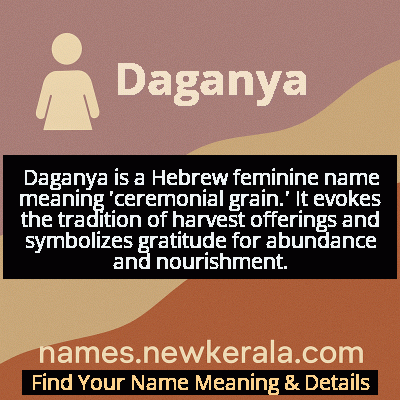Daganya Name Meaning & Details
Origin, Popularity, Numerology Analysis & Name Meaning of Daganya
Discover the origin, meaning, and cultural significance of the name DAGANYA. Delve into its historical roots and explore the lasting impact it has had on communities and traditions.
Name
Daganya
Gender
Female
Origin
Hebrew
Lucky Number
8
Meaning of the Name - Daganya
Daganya is a Hebrew feminine name meaning 'ceremonial grain.' It evokes the tradition of harvest offerings and symbolizes gratitude for abundance and nourishment.
Daganya - Complete Numerology Analysis
Your Numerology Number
Based on Pythagorean Numerology System
Ruling Planet
Saturn
Positive Nature
Ambitious, efficient, realistic, and authoritative.
Negative Traits
Materialistic, stressed, confrontational, and can be overly ambitious.
Lucky Colours
Dark blue, black.
Lucky Days
Saturday.
Lucky Stones
Blue sapphire, amethyst.
Harmony Numbers
2, 4, 6.
Best Suited Professions
Business leaders, managers, financial services, law enforcement.
What People Like About You
Leadership, determination, organizational skills.
Famous People Named Daganya
Daganya Ben-David
Agricultural researcher
Pioneered sustainable farming techniques in arid regions
Daganya Cohen
Cultural anthropologist
Documented traditional harvest rituals across Middle Eastern communities
Daganya Levy
Chef and food historian
Revived ancient grain recipes and traditional cooking methods
Name Variations & International Equivalents
Click on blue names to explore their detailed meanings. Gray names with will be available soon.
Cultural & Historical Significance
Throughout Jewish history, grain has represented sustenance, community, and the cyclical nature of life, making Daganya a name that embodies these fundamental cultural values. The ceremonial aspect emphasizes that nourishment is not merely physical but also spiritual, reflecting a worldview where daily sustenance is intertwined with sacred practice. This name particularly resonates with communities that maintain connections to agricultural traditions or who value the symbolic importance of food in religious and cultural identity.
Extended Personality Analysis
Women named Daganya typically exhibit nurturing and grounded personalities, often serving as stabilizing forces within their communities. They tend to be practical yet deeply spiritual individuals who value tradition while adapting it to modern contexts. Their connection to the name's agricultural roots often manifests as patience, resilience, and an understanding of natural cycles - qualities that make them excellent at long-term planning and supporting others through difficult periods.
Daganyas are often described as having an innate wisdom about when to act and when to wait, much like farmers understanding seasonal rhythms. They typically possess strong organizational skills and a generous spirit, frequently taking on roles that involve caring for others or preserving cultural traditions. While they may appear reserved initially, they develop deep, lasting relationships and are known for their reliability and thoughtful approach to problem-solving. Their strength lies in their ability to nurture growth in both people and projects, creating environments where others can flourish.
Modern Usage & Popularity
In contemporary times, Daganya remains a relatively rare but meaningful choice among Hebrew-speaking communities and those seeking to connect with Jewish agricultural heritage. The name has seen a slight resurgence among families interested in nature-based names and those wanting to honor traditional farming practices. While not appearing on mainstream popularity charts, it maintains a steady presence in Israel and among diaspora communities, particularly those with connections to kibbutz movements or agricultural backgrounds. Modern parents often choose Daganya for its unique sound and deep cultural resonance rather than following naming trends, making it a distinctive choice that reflects both personal values and cultural continuity.
Symbolic & Spiritual Meanings
Symbolically, Daganya represents abundance, gratitude, and the sacred cycle of giving and receiving. The ceremonial grain aspect signifies both physical nourishment and spiritual offering, making it a name that bridges earthly and divine realms. It embodies the concept of first fruits - the practice of dedicating the initial and best portion of harvest to higher purposes. This symbolism extends to personal qualities of generosity, patience through growth periods, and understanding that all abundance comes with responsibility. The name also carries metaphors of transformation - from seed to harvest, from raw material to sacred offering - suggesting personal growth and the potential for ordinary elements to become extraordinary through intention and care.

